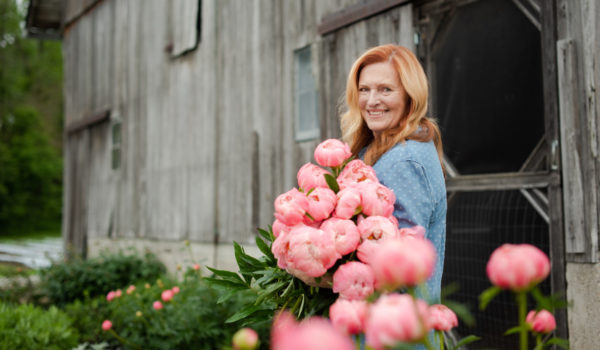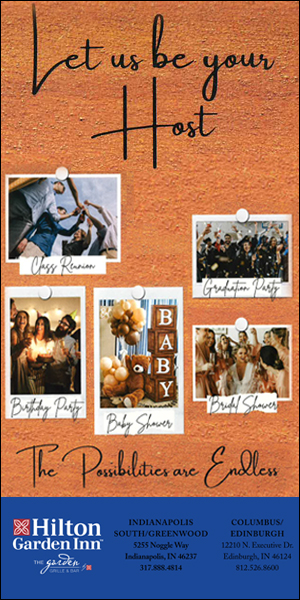
Pamela Parker talks about JP Parker Flowers’ longtime stamen power
By Glenda Winders // Photography by Angela Jackson
If you were to describe Pamela Parker in one word, it would probably be “gutsy.” Such a word might stand in contrast to her product, her passion: flowers. But that’s the power of contrast, and one would choose “gutsy” for good reason. Take, for example, how she came to start her business, JP Parker Flowers.
After the Indiana native finished her degree in horticulture at the University of Minnesota, Parker stayed on in the land of 10,000 lakes, spending 13 years working at Hermes Floral, an upscale florist in Minneapolis.
During her tenure at Hermes, the horticulturalist designed and produced holiday decorations for the General Mills headquarters as well as flowers for such high-end clients as the Pillsbury family. But when her father became ill and died at 52, she decided it was time to return to live on her family farm, on the Shelby County side of the Johnson-Shelby line.
Flower power
The third-generation farmer’s love of flowers had grown deep roots, but Parker found that the flower business had not taken off in central Indiana as it had in other states and bigger cities. How could she re-establish herself in the floral industry that she loved?
“I had to reinvent myself,” she says. “I still had my little briefcase; I just didn’t have a company.” Parker and her sister and first official employee, Janet — the “J” in JP Parker — filled the family farm where they had grown up with flowers: acres of sunflowers, fields of peonies, rows of marigolds and many others.
Parker did some homework and learned that Union Station had recently been renovated, so she made an appointment with management and said she would like to take charge of its Christmas decorations. They said yes.
“All of a sudden, I had to develop a company just to pull off that job in about six weeks,” she says. “At Hermes I had many people, lots of big trucks and lots of backup, and now I had sold a job without any of that. I just had me.”
She rented a dilapidated building in Whiteland (“When it snowed outside, it snowed inside”) and hired as many unemployed people — all women — as she could find to help.
“We pulled that job off,” she says. “Those housewives and moms saved me, and they taught me that everyone is creative. If you give your team a purpose and set a goal, you can achieve it.”
With the Union Station job behind her and work from Indianapolis beginning to come in, she had another idea: Why not convert the barn where her father and grandfather had raised cows and pigs into a facility where she could create floral arrangements for events? When Karen Morgason, now the senior bridal designer, applied for a job, saying she would like to work with flowers, Parker first roped her into helping clean the barn. The two have now been together for 25 years.
“When Pam has a vision, you just hang on to your seat because she’s going to take you there,” Morgason says. “She expects a lot, but she also expects a lot from herself. I wouldn’t have grown as much as I have without her. If she can do it, she thinks you can do it, and then you just do it. She teaches her employees what she knows, and she is so generous — an amazing lady to work for.”
Greener pastures
The barn, outfitted with antique rugs and furniture, became a place people visited when they came to see the fields of flowers and buy floral arrangements. Clients came from Indianapolis, including the two interior designers who were startled when Parker’s pet hen, Lady Di, laid an egg under the table where they were sitting and commenced loudly clucking.
“Lady Di pushed me over the edge,” Parker says, laughing. “I said, ‘We need to get a storefront.’”
The barn was hot in summer and cold in winter, and the business really had outgrown the farm. And Parker had another consideration: She had married Larry Tucker, the high school sweetheart with whom she had graduated from Southwestern High School in Shelby County. She was ready to separate her home life from her business.
“We opened in Franklin in 2004, and that has been a wonderful experience,” she says. “Franklin is such a progressive city on the move, and it’s a wonderful place to do business.”
But the bulk of their orders continued to come from Indianapolis. They were doing the flowers for Indy 500 events each year and many other parties and weddings. That led to the opening of the South Meridian location in 2008, and in 2012 they provided flowers for a lot of the Super Bowl events.
This might sound like the ideal trajectory for a small business to follow, but along the way there were big bumps in the road. A lot of business dried up after Sept. 11, 2001.
“People were scared, and the economy froze,” Parker says. “And then, as now, my first concern was the people who work for me. We did the things we never have time for when we’re busy with our jobs. We built some props and designed a new floor plan for the barn.”
In 2008 the recession again caused business to diminish.
“We had just done the opening of the new airport, and business was good, and we were on top of the world,” Parker says. “And then the bottom fell out. Everything was canceled. I said, ‘OK, we’ll do whatever we need to do just to keep working.’” During that time they spent the slow hours building up their wedding business.
Personalized petal pushing
Recently, when the coronavirus pandemic struck, she regrouped again, bringing some of the employees to the farm to plant, weed and do the many other chores associated with growing flowers. Morgason worked from her home to rebook canceled weddings. The staff is also doing the harvesting this year, which would typically be done by high school and college students. Now, thanks to the extra time yielded by COVID-19, the farm is blooming with more flowers than ever before.
“We were going like gangbusters in January and February — we’d never had a better year — and suddenly we had to close down,” Parker says. “Again I looked at my employees and thought, ‘How am I going to save them?’I don’t think you’re a decent business owner if you don’t care for the people who work for you.”
That level of caring also extends to her customers. She makes every effort to ensure no one has to talk to a machine.
“I want people to talk to an actual person, especially if it’s a funeral,” Parker says. “If a family is calling us, they’re in grief.” She says she likes to make every arrangement personal to the family, and she doesn’t like the books where people pick out their flowers by number. She and her staff ask the families what the person was like, what hobbies they enjoyed. When Leon Snyder, the horticulture professor whom Parker credits with influencing her life, died, Parker gathered plants in Minnesota for his service. When her brother-in-law passed away recently, she incorporated the letters his grandchildren had written to him during his illness into the flowers. All of her customers get the same consideration. “Flowers are my life,” she says. “We’ve built what we have with lots of blood, sweat, tears and investment.”
Parker is immersed; she and Tucker (a retired pharmacist who was already a farmer and is now the company’s grower) started their recent vacation at a flower conference in Ohio before continuing on with their road trip. The books she reads are about flowers — specifically those by Debra Prinzing — and Parker admires the slow-flower movement that millennials are embracing.
“I love what the millennials are doing to our industry,” she says. “Even before the pandemic they were interested in naturally grown flowers. They want to know where their flowers and food come from, that the chemicals used on them won’t harm people and that there is no child labor.”
Travels with Flora
Something else that excites her is the newest member of her team, “Flora,” a colorfully painted step van equipped with an awning that allows her to sell at office buildings, farmers markets and the like so people can pick up flowers without going to a store. When she bought the truck, she wasn’t sure how she would use it.
“Isn’t it ironic that we didn’t have a plan for Flora, and now Flora is the plan?” she says.
Although it might seem that Parker has spent a lot of her career heading off crises, she has had many more good years than bad, with a lot of special events along the way. For one, she went through the rigorous steps to become a Woman Business Enterprise, a coveted designation for women-owned businesses. Another was joining the National Association of Women Business Owners in 2008.
“I’ve met women entrepreneurs who are just like me, who have built a business literally from scratch,” Parker says. “My respect for them and theirs for me is like a sisterhood. We can say to each other, ‘I know what you’ve gone through, I know how hard you’ve worked.’ It has been like a shot in the arm to me.”
One of the women she met there is Janet South, president of Indianapolis-based DECO Coatings Inc. At the first NAWBO meeting South attended, Parker asked her to do some work in one of the stores, and they became friends during that project.
“Her perspective is to provide happiness and comfort through beautiful floral arrangements,” South says. “She always has a smile and is encouraging no matter what is going on around her. Her compassion and intuitive nature give her the insight to meet any need, from creative celebrations to graceful condolences. She is an amazing woman that I am proud to call my friend first as well as my business associate.”
Parker says her experience with NAWBO has made her want to inspire other women who want to start a business.
“I want to tell them, ‘You can do it, too. It isn’t an easy life, and it doesn’t come without sacrifices,” she says. “And if the bottom drops out, it’s a new beginning, not an end. We’ve had mountains to climb, and we’ve made it.”
She credits Mel McMahon Stone — a public speaker who tells the story of rebuilding her life after the loss of a child in “It Isn’t the End” — for that bit of optimism. Uncomfortable with accepting accolades, she also credits a lot of other people with her success, such as Snyder, Prinzing and her employees for making the business as successful as it is.
“I’ve always surrounded myself with competent people,” she says. “They are really good at what they do.”
The person she credits most, however, is her grandmother, who gave Parker her love of flowers and a feisty, can-do attitude. Her grandparents were self-sustaining, and they grew crops that no one else was growing, such as raspberries and chrysanthemums. Her grandmother canned what she grew in creative ways, gathering blue ribbons at each year’s state fair. When an interviewer asked why she didn’t step aside and let someone else win, her response was, “Why don’t they just get better?”
“I adore her for that line and for her competitive spirit,” Parker says. “She was sweet, but she was a fighter.”
She could just as well have been talking about herself.


